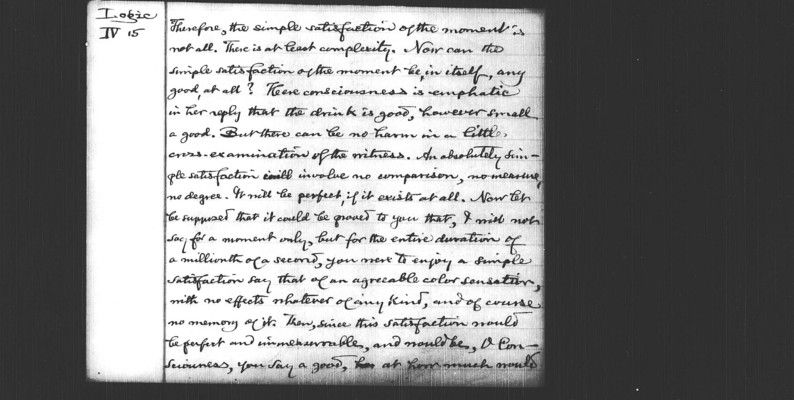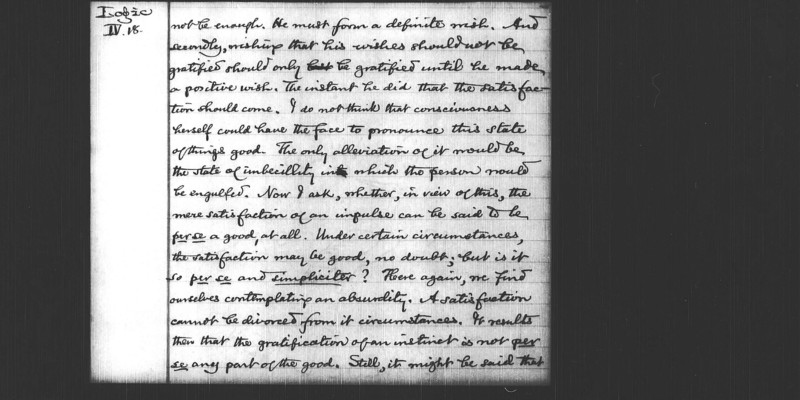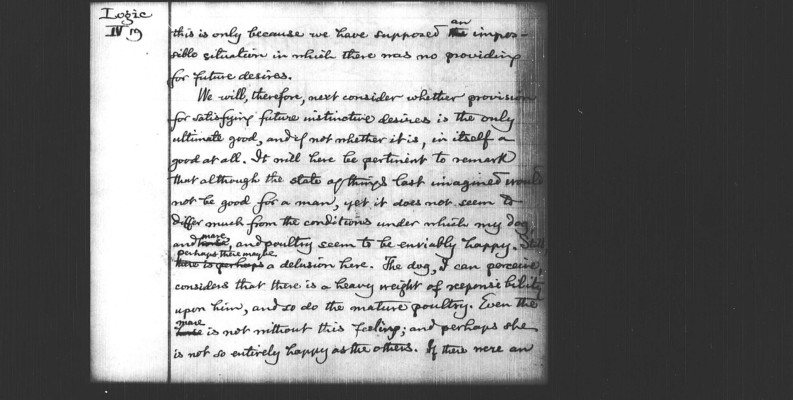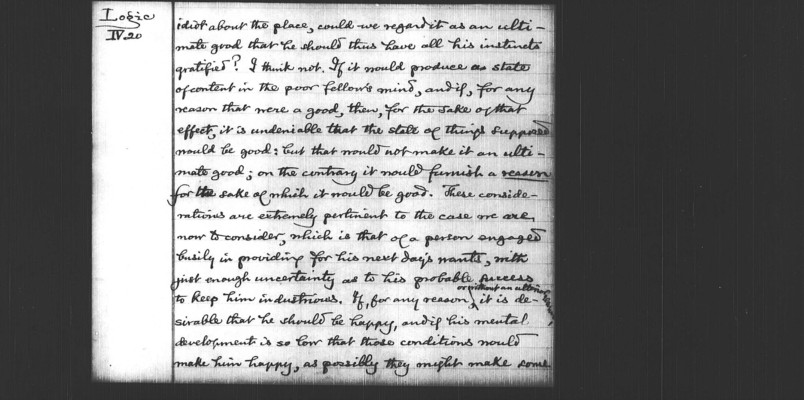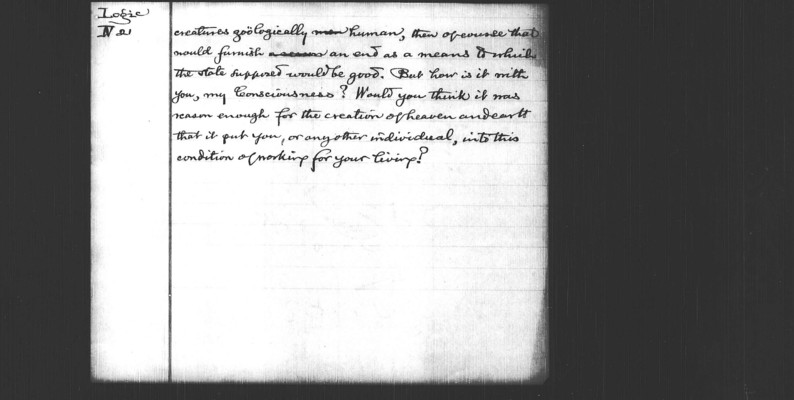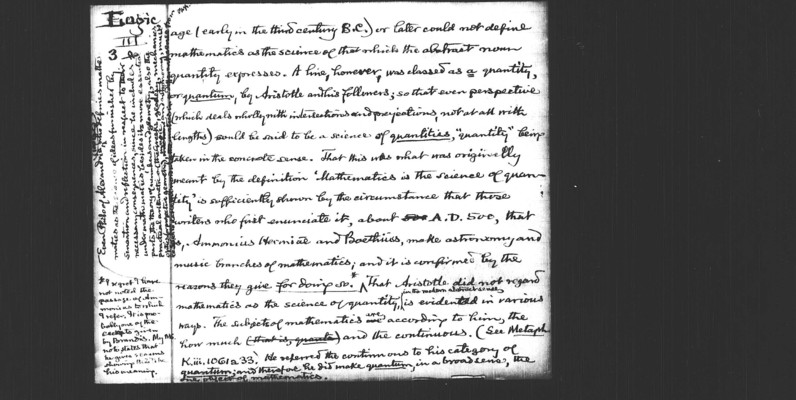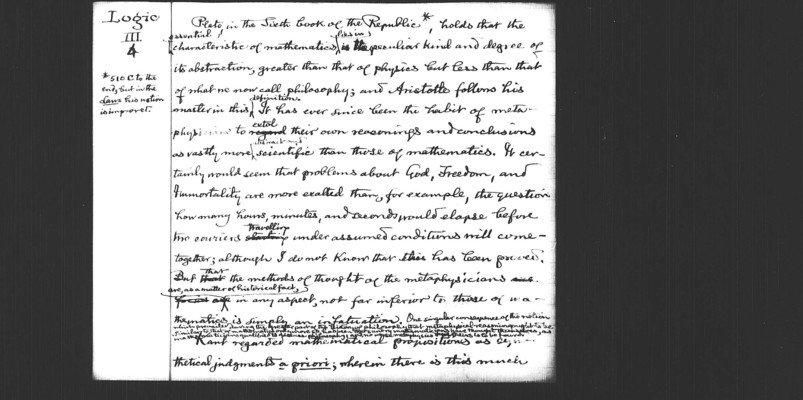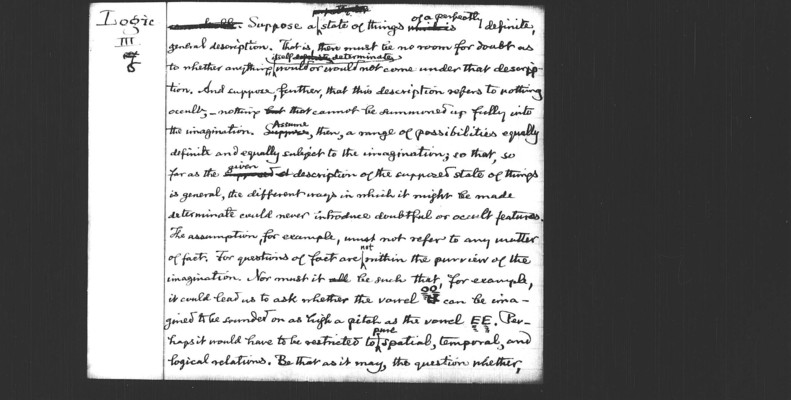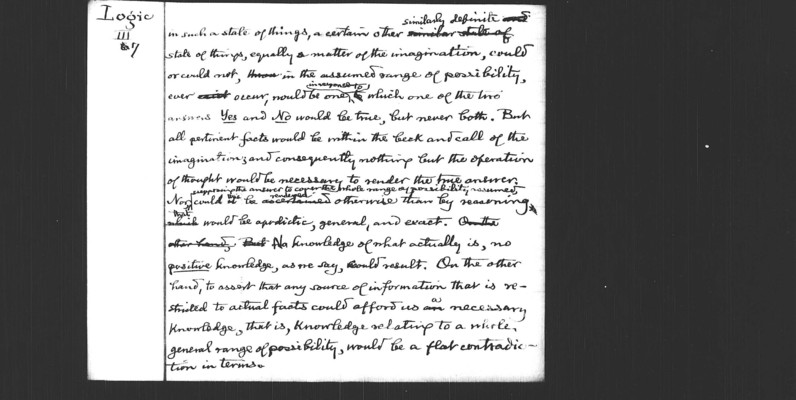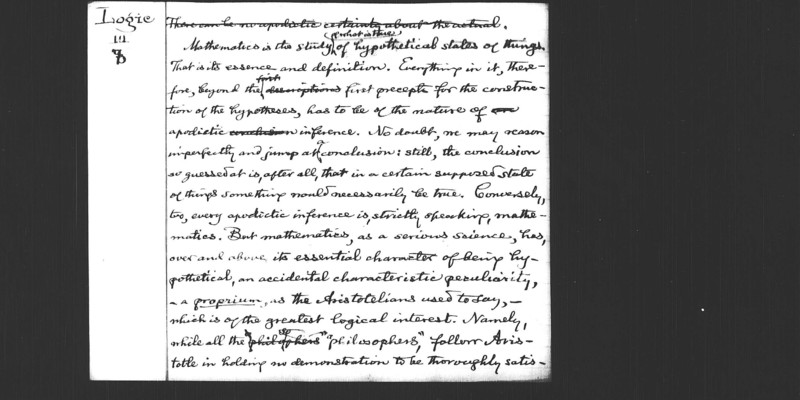Pages That Need Review
MS 433 (1902) - Minute Logic - Chapter IV
15
Logic IV. 15 Therefore, the simple satisfaction of the moment is not all. There is at least complexity. Now can the simple satisfaction of the moment be, in itself, any good, at all? Keene consciousness is emphatic in her reply that the drink is good, however small a good. But there can be no harm in a little cross-examination of the witness. An absolutly simple satisfaction will involve no comparison, no measure, no degree. It will be perfect, if it exists at all. Now [lets] be supposed that it could be proved to you that, I will not say for a moment only, ut for the entire duration of a millionth of a second, you were to enjoy a simple satisfaction say hat of an agreeable color sensation, with no effects whatever of any kind, and of course no memory of it. Then, since this satisfaction would be perfect and immeasurable, and would be, a consciousness, you say a good, [at] how much would
18
not be enough. He must form a definite wish. And secondly, wishing that his wishes should not be gratified should only be gratified until he made a positive wish. The instant he did that the satisfaction should come. I do not think that consciousness herself could have the face to pronounce this state of things good. The only alleviation of it would be the state of imbecillity in which the person would be engullfed. Now I ask, whether, in view of this, the mere satisfaction of an impulse can be said to be per se a good, at all. Under certain circumstances the satisfaction may be good, no doubt, but is it so per se and simpliciter? Here again, we find ourselves contemplating aan absurdity. A satisfaction cannot be divorced from its circumstances. It results then that the gratification of an instinct is not per se any part of the good. Still, it might be said that
19
Logic IV 19 this is only because we have supported an impossible situation in which there was no providing for future desires. We will, therfore, next consider whether provision for satisfying future instinctive desires is the only ultimate good, and if not whether it is, in itself a good at all. It will here be pertinent to remark that although the state of things last imagined would not be good for a man, yet it does not seem to differ much from the condition under which my dog, and mare, and poultry seem to be enviably happy. Still perhaps there maybe a delusion here. The dog, I can perceive considers that there is a heavy weight of responsibilty upon him, and so do the mature poultry. Even the mate is not without this feeling; and perhaps she is not so entirely happy as the other. If there were an
20
Logic IV 20
idiot about the place, could we regard it as an ultimate good that he should thus have all his instincts gratified? I think not. If it would produce a state of content in the poor fellow's mind, and if, for any reason that were a good, then, for the sake of that effect, it is undeniable that the state of things supposed would be good: but that would not make it an ultimate good; on the contrary it would furnish a reason for the sake of which it would be good. These considerations are extremely pertinent to the case we are now to consider, which is that of a person engaged busily in providing for his next day's wants, with just enough uncertainty as to his probably success to keep him industrious. If, for any reason, or without an ultimate reason it is desirable that he should be happy, and if his mental developent is so low that those conditions would make him happy, as possibly they might make some
21
Logic IV 21 creatives zoologically human, then of course that would furnish an end as a means to which the state supposed would be good. But how is it with you, my Counsciousness? Would you think it was reason enough for the creation of heaven and earth that it put you, or any other individual, into this condition of working for a living?
MS 431 (1902) - Minute Logic - Chapter III
2
age (early in the third century B.C.) or later could not define mathematics as the science of that which the abstract [no?] quantity expresses. A line, however, was classed as a quantity, or quantum, by Aristotle and his followers; so that even perspective (which deals wholly with intersections and projections, not at all with lengths) could be said to be a science of quantities, "quantity" being taken in the concrete sense. That this was what was originally meant by the definition 'Mathematics is the science of quantity' is sufficiently shown by the circumstance that these writers who first enunciate it, about A.D. 500, that is, Ammonius Hermiae and Boethius, make astronomy and music branches of mathematics; and it is confirmed by the reasons they give for doing so*.^ That Aristotle did not regard mathematics as the science of quantity, ^in the modern abstract sense, is evidented in various ways. The subjects of mathematics are, according to him, the how much and the continuous. (See Metahph. K.iii.1061a33.) He referred the continuous to the category of quantum, and therefore he did make quantum, in a broad sense, the one [??] of mathematics.
[notes on the side:] Even Philo of Alexandria, who defined mathe matics as the science of ideas furnished by sensation and reflection in respect to their necessary consequences, since he includes under mathematics, besides its more essential parts, the theory of numbers and geometry, also the practical arithmetic of the Greeks, geodesy, mechanics, optics (or projective geometry), magic and astronomy, must [??]
*I regret I have not noted the passage of Ammonius to which I refer. It is probably one of the [??] given by [B?]. My MS. [no?] states that he gives reasons showing [?] to be hos meaning.
3
Margin Sidebar: Logic III [4?] * 510 C to the end, but in the [Laws?[ this notion is improved.
Plato, is the Sixth book of the Republic*, holds that theessential characteristic of mathematics, [Pikes in] [speculiar?] kind and degree of its abstraction, greater than that of physics but less than that of what we now call philosophy; and Aristotle [follwers?] his smarter in this (definition). It has ever since been the habit of [metaphysicians?] to extol their own reasonings and conclusions as vastly more, scientific [(abs?)] than those of mathematics. It certainly would seem that problems about God, Freedom, and Immortaility are more exalted than, for example, the question how many hours, minutes, and seconds would elapse before [tm?] couriers traveling under assumed conditions will come-together; although I do not know that this has been [gor?]. But that the methods of thought or the metaphysicians (crossed out word) are as a matter of historical fact, (2 crossed words), in any aspect, not far inferior to those of [wa?] the [matics?] is simply an infatuation. One singular consequence of the notion which [pre?] during the greater part of the [b?] of philosophy that metaphysical reasoning [sp?] to be similar to that of mathematics only have [has been.......?] [Kant?] regarded mathematical peopositions as [synthetical?] judgments a [gri?]; wherein there is this much
5
Suppose a state of things of a perfectly definite, general description. That is, there must be no room for doubt as to whether anything, itseld determinates, would or would not come under that description. And suppose, farther, that this description refers to nothing occult, - nothing that cannot be summoned up fully into the imagination. S̶u̶p̶p̶o̶s̶e̶ Assume, then, a range of possibilities equally definite and equally subject to the imagination; so that, so far as the given description of the supposed state of things is general, the different ways in which it might be made determinate could never introduce doubtful or occult features. The assumption, for example, must not refer to any matter of fact. For questions of fact are not within the [purview?] of the imagination. Nor must it a̶l̶l̶ be such that, for example, it could lead us to ask whether the vowel oo can be imagined the sounded on as high a pitch as the vowel EE. Perhaps it would have to be restricted to [pme?] spatial, temperal, and logical relations. Be that as it may, the question whether,
6
in such a state of things, a certain other similarly definite state of things, equally a matter of the imagination, could or could not, in the assumed range of possibility, ever e̶x̶i̶s̶t̶ occur, would be one in response to which one of the two answers Yes and No would be true, but never both. But all pertinent facts would be within the [book?] and call of the imagination; and consequently nothing but the operation of thought would be necessary to render the true answer. Nor [^?] supposing the answer to cover the whole range of possibility assumed, could this be rendered otherwise than by reasoning w̶h̶i̶c̶h̶ that would be apodictic, general, and exact. O̶n̶ ̶t̶h̶e̶ o̶t̶h̶e̶r̶ ̶h̶a̶n̶d̶,.B̶u̶t̶ No knowledge of what actually is, no positive knowledge, as we say, would result. On the other hand, to assert that any source of information that is restricted to actual facts could afford us a̶n̶ a necessary knowledge, that is, knowledge relative to a whole, general range of possibility, would be a flat contradiction in terms
7
T̶h̶e̶r̶e̶ ̶c̶a̶n̶ ̶b̶e̶ ̶n̶o̶ ̶a̶p̶o̶d̶i̶c̶t̶i̶c̶ ̶c̶e̶r̶t̶a̶i̶n̶t̶y̶ ̶a̶b̶o̶u̶t̶ ̶t̶h̶e̶ ̶a̶c̶t̶u̶a̶l̶
Mathermatics is the study of what is true of hypotherical states of things. That is its essence and definition. Everything in it, therefore, beyond the f̶i̶r̶s̶t̶ ̶d̶e̶s̶c̶r̶i̶p̶t̶i̶o̶n̶s̶ first precepts for the construction of the hypotheses, has to be of the nature of doubt, apodictic c̶o̶n̶c̶l̶u̶s̶i̶o̶n̶ inference. No doubt we may reason imperfectly and jump at a conclusion: still, the conclusion so guessed at is, after all, that in a certain supposed state of things something would necessarily be true. Conversely too, every apodictic inference is, strictly speaking, mathematics. But mathematics, as a serious science, has over and above its essential character of being hypotherical, an accidental characteristic [peculiarity?] a proprium, as the Aristotelians used today, - which is of the greatest logical interest. Namely, while as the "philosophers," follow Aristotle in holding [?] demonstration to be thoroughly satis-
